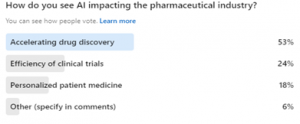
AI in Clinical Trials: Accelerating Drug Development and Improving Patient Outcomes
October 31, 2023By Morgan Bosse
The world of healthcare and pharmaceuticals is undergoing a transformation, with artificial intelligence playing a pivotal role in enhancing productivity in the clinical trial process. AI technologies are at the forefront of drug development by accelerating patient recruitment, optimizing trial design, and enhancing data analysis. This process also improves patient outcomes by ensuring safer and more effective treatments reach the market.
In a recent poll we conducted this month, we asked the question, ‘How do you see AI impacting the pharma industry?’ An overwhelming 53% of respondents believe that AI will have a significant impact on drug discovery. This resounding response underscores the growing recognition of AI’s transformative potential in pharmaceuticals. It’s evident that the industry is increasingly turning to AI as a powerful tool for accelerating drug discovery processes, ultimately leading to more efficient and effective treatments. Let’s dive deeper into how AI is making its mark in drug discovery and other crucial aspects of the pharmaceutical landscape. Continue reading to explore ways AI is making clinical trials more efficient and benefiting both the pharmaceutical industry and patients.

Enhanced Patient Recruitment
One of the most critical stages in the clinical trial process is the recruitment of suitable participants. Historically, this has been a time-consuming and  expensive task, often resulting in delays. AI is changing this landscape by harnessing the power of big data and machine learning to identify potential candidates more effectively. Alastair Denniston, PhD, the director of INSIGHT, a health data research hub for eye health, emphasizes this opportunity, saying, ‘There is potential to employ a straightforward, rules-based AI approach for patient recruitment.’ He further explains that ‘For instance, when provided with eligibility criteria, an automated system can generate a list of potential participants by scrutinizing a hospital database.’ This innovative approach highlights AI’s potential to streamline patient recruitment in clinical trials and ensures that the right patients are being enrolled. Ultimately, this not only reduces recruitment time but also enhances the quality of the trials.
expensive task, often resulting in delays. AI is changing this landscape by harnessing the power of big data and machine learning to identify potential candidates more effectively. Alastair Denniston, PhD, the director of INSIGHT, a health data research hub for eye health, emphasizes this opportunity, saying, ‘There is potential to employ a straightforward, rules-based AI approach for patient recruitment.’ He further explains that ‘For instance, when provided with eligibility criteria, an automated system can generate a list of potential participants by scrutinizing a hospital database.’ This innovative approach highlights AI’s potential to streamline patient recruitment in clinical trials and ensures that the right patients are being enrolled. Ultimately, this not only reduces recruitment time but also enhances the quality of the trials.
Optimized Trial Design
Another area where AI can excel in clinical trials is the design. Machine learning algorithms can analyze historical trial data and generate insights that help in designing more efficient and cost-effective trials. In the build stage, automation can play a crucial role in creating case report forms (CRFs) and building databases. Traditionally, data managers manually generate numerous CRFs for data collection, which can be time-consuming and prone to errors. AI and ML significantly accelerate the process as the technology reads the clinical trial protocol and automatically generates eCRFs and matrices (Source: Medable, [https://www.medable.com/knowledge-center/guides-how-ai-and-ml-can-transform-clinical-conduct]). This overall acceleration significantly contributes to expediting the study start-up phase.
Predictive Analytics
AI’s ability to perform predictive analytics is a game-changer in clinical trials. Predictive models can anticipate potential issues and complications, enabling researchers to proactively address them. It can predict patient dropout rates, the probability of adverse events, and the likelihood of a drug’s success or failure. This helps in making informed decisions during the trial but also minimizes risks, ultimately improving patient safety.
Real-time Data Monitoring
During clinical trials, real-time data monitoring is crucial for identifying trends and outliers that may affect the study’s outcome. AI-powered systems can continuously monitor patients’ data and alert researchers to any deviations or safety concerns. “For example, AI algorithms can detect and predict adverse events by analyzing various data types, such as vital signs and patient-reported outcomes This can help researchers identify potential safety concerns more quickly and take appropriate action, such as modifying the study protocol or adjusting the dosage of the drug being tested” (Source: ACRP, [https://www.acrpnet.org/2023/06/forward-thinking-for-the-integration-of-ai-into-clinical-trials/]. This immediate feedback allows for timely adjustments, ensuring patient safety and maintaining the integrity of the trial.
Regulatory Compliance
The regulatory landscape in clinical trials is complex. AI can help streamline the process by assisting in documentation, compliance standards, and automating reporting. This reduces the administrative burden on the Regulatory Affairs team.
AI’s integration into clinical trials is a significant leap forward in the pharmaceutical industry. From more efficient patient recruitment and trial design to predictive analytics and real-time data monitoring, AI is accelerating drug development and overall improving patient outcomes. By reducing costs and expediting the process, AI benefits both pharmaceutical companies and patients waiting for treatments that can be life-changing. As AI continues to evolve, the future of clinical trials looks increasingly promising with faster drug development and better therapies on the horizon.
At Joulé, we believe our world is filled with possibilities – where character, integrity, and commitment drive our purpose. Operating at the forefront of the life sciences arena, Joulé’s relentless approach enables our clients to execute critical initiatives and significant projects rapidly and effectively. Joulé is a System One division.
Sources:
“How AI is Transforming Clinical Trial Recruitment,” Clinical Trials Arena, [https://www.clinicaltrialsarena.com/features/ai-clinical-trial-recruitment/?cf-view]
“How AI and ML Can Transform Clinical Conduct,” Medable, [URL: https://www.medable.com/knowledge-center/guides-how-ai-and-ml-can-transform-clinical-conduct]
